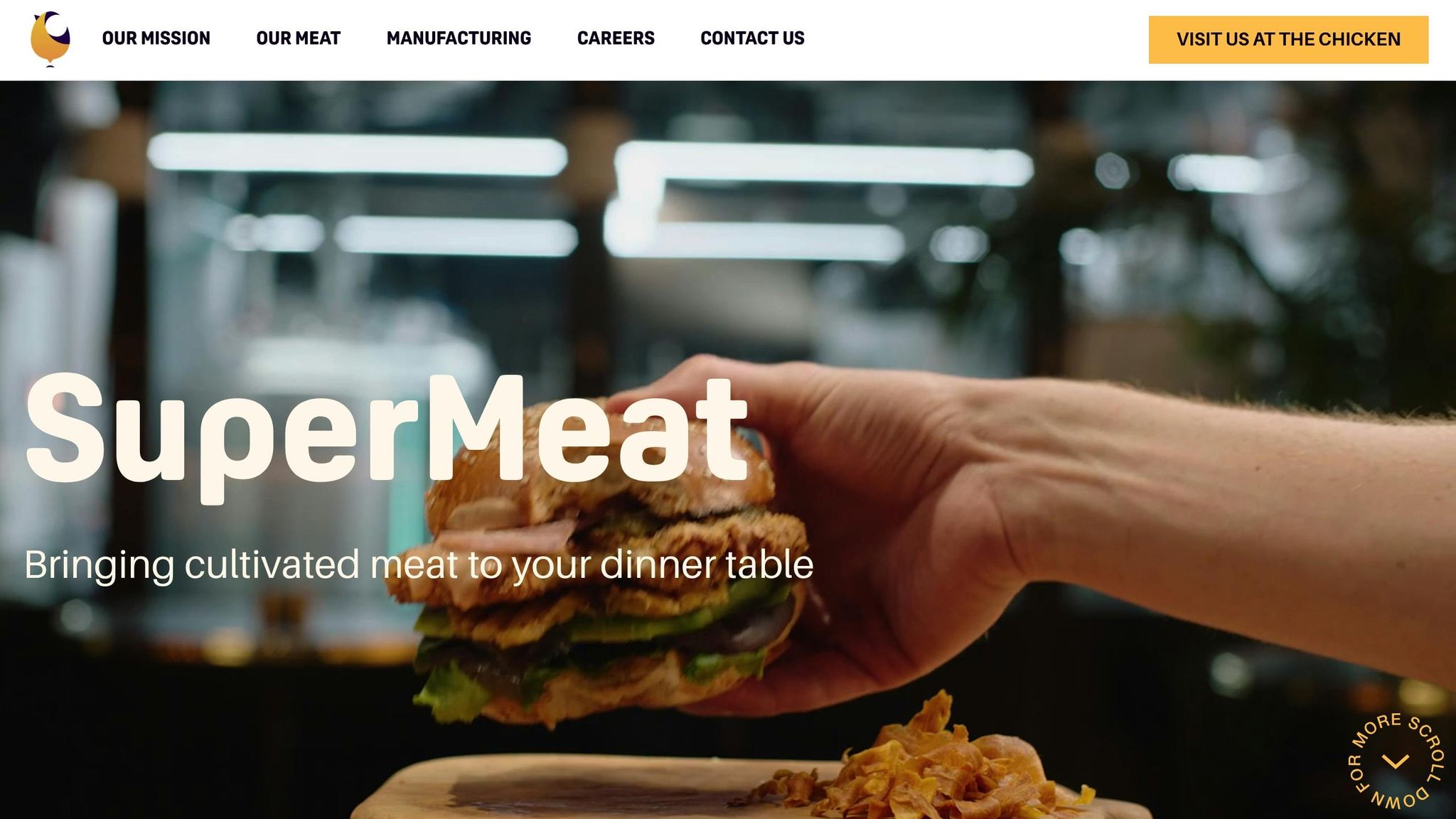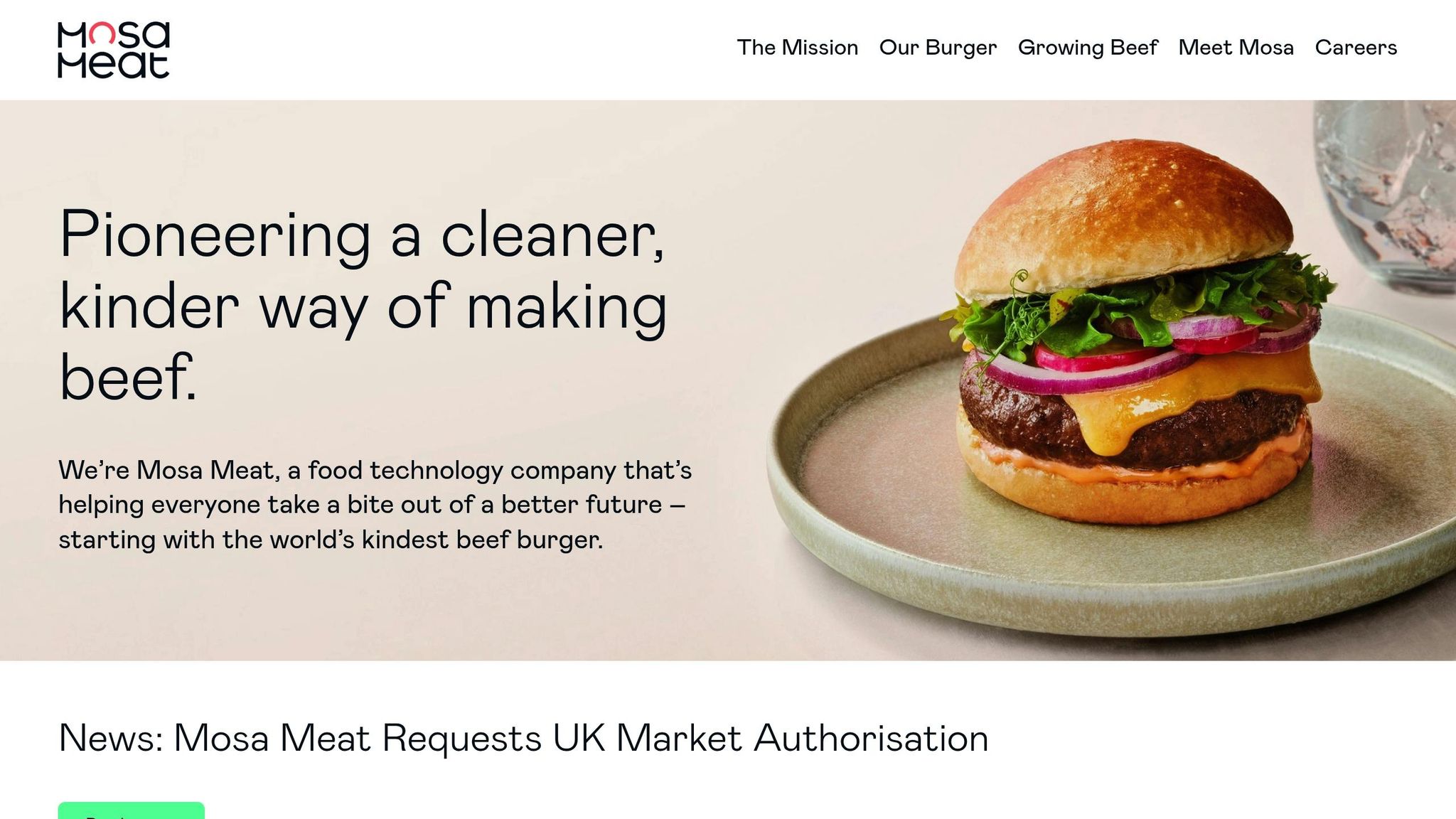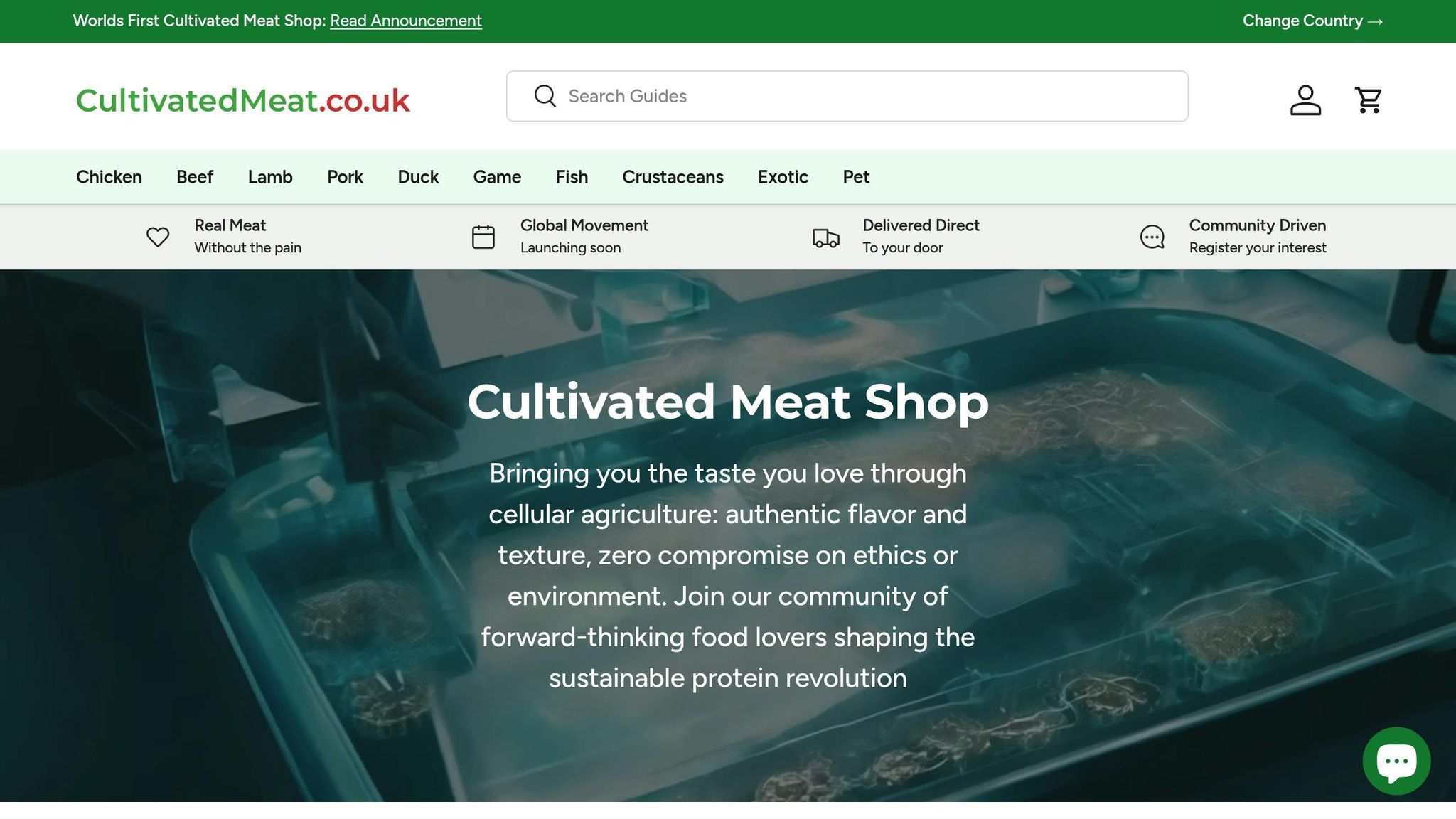The growing demand for cultivated meat has spurred creative funding and community strategies. Companies like SuperMeat, Mosa Meat, and Cultivated Meat Shop have adopted distinct approaches to secure support and engage their audiences. Here's what we can learn:
- SuperMeat (2016): Simplified complex science, prioritised transparency, and focused on ethical themes. Raised $230,000 via Indiegogo, attracting over 5,000 backers.
- Mosa Meat (2025): Emphasised inclusivity and rapid funding success. Raised €2.65 million in two days on Crowdcube, backed by over 1,100 investors.
- Cultivated Meat Shop: Focused on consumer education and trust-building. Simplified the science behind cultivated meat and engaged curious audiences.
Quick Comparison
| Company | Focus | Funding | Community Strategy | Key Achievement |
|---|---|---|---|---|
| SuperMeat | Ethical themes, transparency | $230,000 via Indiegogo | Rewards for backers, transparent updates | Attracted 5,317 backers in 2016 |
| Mosa Meat | Inclusivity, rapid funding | €2.65 million via Crowdcube | Global investor participation, events | €1.5M in 24 minutes, €2.65M in 2 days |
| Cultivated Meat Shop | Consumer education | N/A | Simplifying science, awareness-building | Positioned for long-term consumer trust |
These campaigns highlight the importance of clear communication, community involvement, and tailored strategies to promote cultivated meat.
1. SuperMeat's Campaign Approach

Back in 2016, SuperMeat launched one of the first successful crowdfunding campaigns in the cultivated meat industry through Indiegogo. This Israeli startup demonstrated how early-stage companies can simplify complex science and inspire a community around a shared mission.
Mission and Storytelling
SuperMeat built its campaign around a compelling narrative that struck a chord with a broad audience. Instead of diving deep into the technicalities of cellular agriculture, the company focused on themes that everyday consumers could connect with - environmental sustainability and ethical food production.
"SuperMeat's mission is to bring the world the highest quality chicken meat, grown directly from cells, in a sustainable and animal-friendly process. We believe cultured meat will enhance the food system, providing nutritional security, drastically reducing carbon emissions, and increasing food safety worldwide." [1]
The campaign leaned on powerful data to strengthen its message. According to research from Oxford and Amsterdam Universities, SuperMeat's products were designed to use 99% less land, 98% less water, and emit 96% fewer greenhouse gases compared to traditional meat production [4]. Adding to this urgency, the company cited U.N. Food and Agriculture Organisation predictions that global meat demand would double by 2050, positioning their product as a necessary response to a growing global challenge [4].
Funding Milestones
SuperMeat's campaign showed how clear funding goals can drive momentum. The company hit its initial $100,000 target on Indiegogo in under two weeks, sparking further interest [5]. They outlined specific milestones to give backers a clear sense of progress:
- Surpassing $500,000 would fund a proof of concept.
- Reaching $1 million would allow cost-efficient production of small chicken tissues.
- Hitting the $2.5 million goal would fund a prototype ready for tasting [5].
Although the campaign raised $230,000, this early success attracted institutional investors, helping SuperMeat secure $3 million in seed funding by January 2018. Notable investors included New Crop Capital and Stray Dog Capital [6][7][8].
This structured funding strategy laid the groundwork for a broader community-focused approach.
Community Engagement
SuperMeat understood that the long-term success of cultivated meat relied on consumer acceptance, making community engagement a cornerstone of its campaign. The company made this clear in its messaging:
"Involving and growing our community is of high importance to us at SuperMeat. Therefore, we aim to not only collect crowdfunded investments with this campaign but also ensure our groundbreaking message of change reaches as many people as we can." [1]
To build excitement, the campaign offered rewards such as vouchers (ranging from $20 to $1,500) redeemable for SuperMeat products once available, along with branded merchandise like hats, shirts, and bracelets [1]. The campaign attracted over 5,000 backers, showcasing genuine consumer interest in cultivated meat and providing crucial market validation for future investments and partnerships.
2. Mosa Meat's Funding Strategy

Mosa Meat approached crowdfunding with a sharp focus and a well-executed plan, launching its campaign in February 2025. This Dutch company, known for creating the world's first cultivated beef burger in 2013 - an achievement that came with a hefty price tag of €250,000[9] - showed how its established reputation could drive rapid funding success.
Mission and Storytelling
The company crafted its story around its innovative history and a commitment to inclusivity in investment. By positioning itself as a trailblazer in food innovation, Mosa Meat invited supporters to join its mission to reshape the future of food. CEO Maarten Bosch highlighted this vision:
"This campaign is about inclusivity; allowing those who support us to help shape the future of food alongside us" [11].
Mosa Meat also emphasised its goal of transforming meat production to significantly reduce greenhouse gas emissions, conserve land and water, and minimise animal suffering[10]. Adding to its credibility, the company showcased its B-Corp certification - the first ever awarded to a cultivated meat company[10].
Funding Milestones
The results of the crowdfunding campaign were nothing short of impressive. Mosa Meat set an initial target of €1.5 million and reached it in just 24 minutes[11]. By the end of the first day, the campaign had exceeded 150% of its goal, attracting over 800 investors within 24 hours[11]. By 6 February 2025, the campaign had raised more than €2.65 million from over 1,110 investors, with a single contribution as high as €1 million[2]. The funds were earmarked for finalising research and development, ramping up marketing efforts, and supporting commercial production[11]. This swift success helped Mosa Meat build a strong, engaged global investor community.
Community Engagement
Mosa Meat's strategy revolved around fostering a sense of shared ownership and making the campaign accessible worldwide. Investors from over 180 countries were able to participate, significantly broadening the company's support base[12]. In their own words:
"Crowdfunding allows us to invite our earliest supporters to truly become part of the Mosa Meat journey" [12].
To make the campaign even more appealing, Mosa Meat offered exclusive perks, such as dining events where backers could taste cultivated meat products, adding a personal and tangible touch to their investment[10]. High-profile endorsements from figures like Sergey Brin, Chris Sacca, and Leonardo DiCaprio added further credibility to the campaign. These endorsements were backed by the company's track record of raising over €120 million from institutional investors prior to the crowdfunding effort[12]. Additionally, a partnership with Michelin-starred chef Hans van Wolde highlighted the culinary quality of their products[12].
Transparency was a key element of the campaign, with regular updates shared via press releases, social media, and Crowdcube. The campaign officially closed on 25 February 2025, leaving behind a strong foundation for future growth[11].
3. Cultivated Meat Shop's Community Building

Unlike the investment-heavy strategies seen with SuperMeat and Mosa Meat, Cultivated Meat Shop has taken a different path. This UK-based platform prioritises consumer education and building excitement around cultivated meat long before its products hit the shelves.
Mission and Storytelling
Cultivated Meat Shop proudly claims to be the first platform designed with consumers in mind, entirely dedicated to cultivated meat. Its storytelling revolves around simplifying the science behind cultivated meat, explaining that it’s “real meat grown from cells, not slaughter.”
But this isn’t just about selling a product. The platform’s mission is to be a trusted guide for consumers curious about this new food technology. By breaking down complex concepts into straightforward explanations, they aim to pave the way for widespread acceptance of cultivated meat.
This focus on education is addressing a significant gap. Studies reveal that 64% of American consumers are unaware of cultivated meat[15]. For a market still in its infancy, this lack of awareness presents a huge opportunity. Cultivated Meat Shop understands that before people are willing to buy, they need to understand - and trust - what they’re buying.
Community Engagement
The platform’s strategy is all about engagement without pressure. Instead of pushing for immediate sales or investments, they invite consumers to explore at their own pace. This includes sharing knowledge, offering waitlist sign-ups, and providing sneak peeks into what’s coming.
This educational-first approach has been incredibly effective. By offering clear, science-backed content, the platform satisfies consumer curiosity while fostering trust. For instance, they compare cultivated meat to traditional meat, addressing concerns and building confidence in the product.
Cultivated Meat Shop also tailors its content to different audiences. Whether someone is a flexitarian, a meat-reducer, or a food-tech enthusiast, the platform speaks directly to their interests - be it environmental concerns, food safety, or just curiosity about cutting-edge technology.
The platform draws inspiration from other successful community-building efforts in the cultivated meat space. For example, Silicon Valley’s BioCurious offers lab resources and workshops for the public to explore biology, while Japan’s Shojinmeat Project encourages DIY cell agriculture with accessible materials[14]. These hands-on educational models show how engaging consumers directly can build a loyal community.
sbb-itb-c323ed3
Campaign Comparison
The campaigns by SuperMeat, Mosa Meat, and Cultivated Meat Shop each follow distinct strategies, tailored to their specific audiences and funding goals. By comparing their funding results and community engagement efforts, we can draw some clear insights.
SuperMeat places a strong emphasis on transparency to build trust. Their approach relies heavily on showcasing their processes, which helps establish credibility. However, this method is somewhat limited by the physical constraints of their reach.
Mosa Meat, in contrast, demonstrated an impressive ability to raise funds quickly. The company secured €1.5 million in just 24 minutes and €2.65 million within two days, reflecting strong interest from investors even during a period of challenging venture capital conditions. As Bosch noted, this level of support is remarkable given the current difficulties in securing VC funding [2].
Cultivated Meat Shop took a different route, focusing on long-term consumer education and community building. Instead of aiming for immediate financial gains, they prioritise creating awareness and fostering a deeper understanding among consumers, which could drive sustained interest and market growth in the future.
Each of these strategies comes with its own strengths. SuperMeat builds trust through transparency, Mosa Meat capitalises on rapid investor interest, and Cultivated Meat Shop invests in educating and engaging curious consumers for the long haul. Together, they highlight the diverse opportunities available in promoting cultivated meat.
The decline in venture capital investment - down by 75% in 2023 and continuing to drop in 2024 [2] - has made these varied approaches more relevant than ever. Mosa Meat’s crowdfunding success proves that consumer interest can supplement traditional funding methods effectively.
Community engagement has also been a critical factor. Research shows that campaigns focusing on ethical values, sustainability, and regular, interactive updates tend to attract more support [16]. Mosa Meat’s inclusive messaging is a great example of this:
"This campaign is about inclusivity; allowing those who support us to help shape the future of food alongside us" [13].
While SuperMeat’s transparency builds immediate trust, its reach remains limited. Mosa Meat’s rapid fundraising highlights its ability to mobilise capital, though maintaining strong investor relations will be key for long-term success. Meanwhile, Cultivated Meat Shop’s focus on community education sets the stage for broader consumer awareness in the future. A combined strategy that incorporates elements of all three approaches could pave the way for the next wave of cultivated meat promotion.
Conclusion
Looking at the success of cultivated meat campaigns, five key takeaways emerge for crowdfunding efforts in the UK: clear communication builds trust, speedy fundraising shows market demand, community involvement ensures lasting support, timing makes a difference, and inclusive messaging connects with a wider audience.
Take Mosa Meat, for example. They raised €1.5 million in just 24 minutes, proving how quickly consumer interest can translate into financial backing [17]. Their focus on ethical values and sustainability created a strong community base, while their timing - aligned with regulatory developments in the EU, Switzerland, and the UK - amplified their campaign’s reach [2]. Inclusive messaging also played a vital role. By highlighting shared ownership in the future of food, Mosa Meat attracted over 800 new investors [17].
These lessons are especially relevant for the UK. Research shows that 80% of UK consumers are at least somewhat interested in trying cultivated meat, with interest even higher among Gen Z (88%) and Millennials (85%) [19]. But here’s the catch: fewer than 2% of consumers correctly understand the term "cultured meat" [18]. As Jaczniakowska-McGirr from ProVeg International pointed out:
"This showed that, as an industry, we have a good opportunity to shape future perceptions" [18].
This is where platforms like Cultivated Meat Shop step in. They’re not just waiting for products to hit the shelves - they’re actively educating consumers about what cultivated meat is, how it’s made, and its potential benefits for health and sustainability. Features like waitlist sign-ups and product previews keep consumers engaged while bridging the gap between curiosity and market readiness.
Building trust is crucial, and research highlights the importance of educating consumers about how cultivated meat is produced and why it matters [3]. With government approval seals being a priority for UK consumers and initiatives like the FSA's regulatory sandbox programme underway [19][20], this educational groundwork becomes even more critical. Platforms like Cultivated Meat Shop are perfectly positioned to prepare the UK public for this emerging food category.
For future UK campaigns, combining transparent communication, fast fundraising (as seen with Mosa Meat), and the educational efforts of platforms like Cultivated Meat Shop offers a solid strategy. This blend of approaches provides a clear path to navigate the UK market’s unique challenges as cultivated meat edges closer to mainstream acceptance.
FAQs
How do companies like SuperMeat and Mosa Meat use storytelling to promote cultivated meat?
Companies like SuperMeat and Mosa Meat use storytelling to forge meaningful connections with their audiences, spotlighting the ethical, environmental, and forward-thinking aspects of cultivated meat. SuperMeat centres its narrative on creating a sustainable and cruelty-free alternative to conventional meat, often sharing stories about their technological progress and the positive ripple effects of their work. Meanwhile, Mosa Meat focuses on reducing animal suffering and safeguarding the planet, using captivating videos and campaigns to highlight their scientific achievements and ambitious plans for the future.
By weaving these engaging stories, both companies build trust and enthusiasm among consumers, helping to drive the cultivated meat movement forward.
What are the best ways to build trust with consumers in the cultivated meat industry?
Building trust in the cultivated meat industry hinges on transparency, education, and meaningful engagement. It's essential to clearly explain how cultivated meat is made, highlighting its safety, ethical advantages, and environmental impact. By sharing straightforward, factual information, you can dispel myths and strengthen consumer confidence.
Partnering with early adopters and influencers can be another powerful strategy. These individuals can serve as advocates, sharing their experiences and helping to make cultivated meat feel more familiar and acceptable. Tailoring your message to align with consumer values - like animal welfare, reducing environmental harm, and delivering great taste - ensures it resonates on a personal level.
Equally important is maintaining open communication. Sharing updates about progress, tackling challenges head-on, and discussing advancements in this growing field can nurture long-term trust and keep consumers engaged.
Why is educating consumers vital for the success of cultivated meat platforms like Cultivated Meat Shop?
Educating consumers plays a crucial role in the success of cultivated meat platforms like Cultivated Meat Shop, as it helps establish trust and confidence in this emerging food category. By addressing common concerns about safety, nutritional value, and environmental impact, education helps to make cultivated meat feel less mysterious and more accessible.
For many, the process behind cultivated meat and its potential benefits compared to traditional meat remain unclear. Providing clear and engaging information ensures people grasp its practical advantages, encouraging acceptance and interest. This understanding lays the groundwork for a positive perception and prepares the market for what could be the future of meat.













